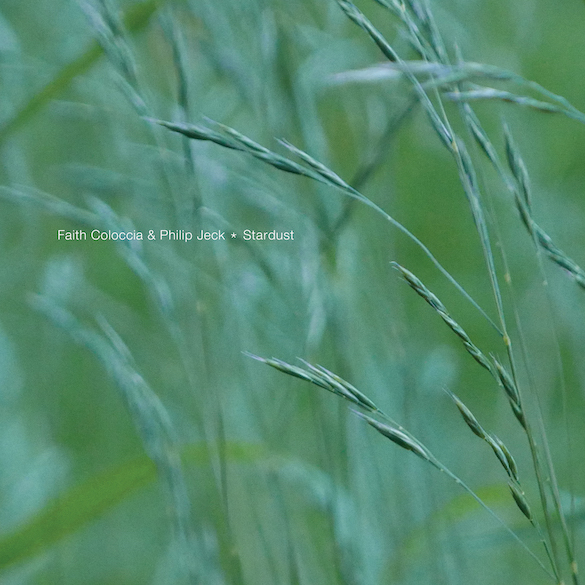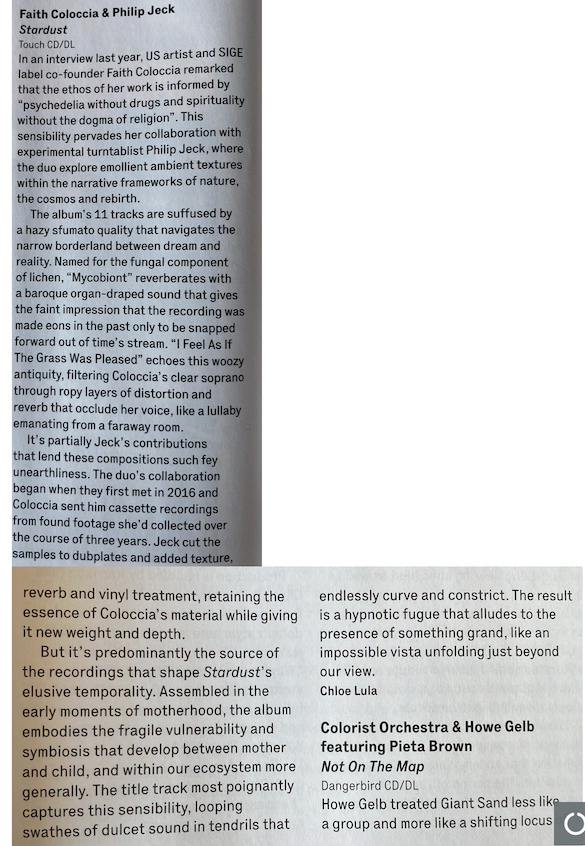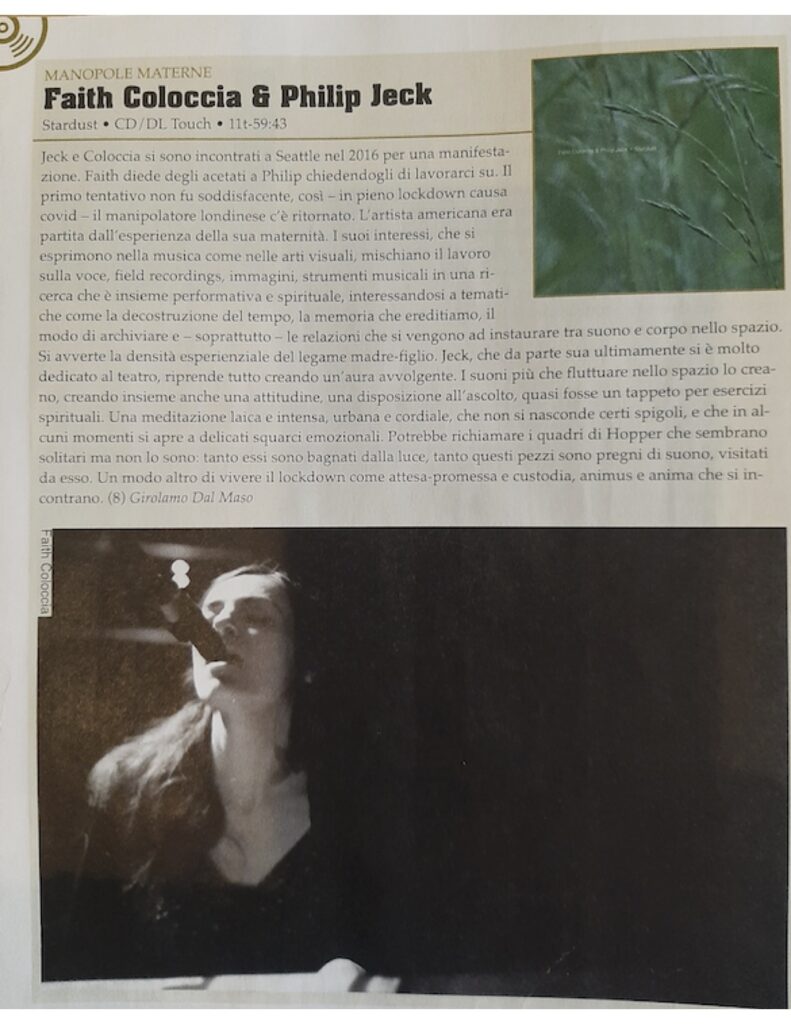
CD – 11 tracks – 59:46
Track listing:
1. Stardust
2. Archaea
3. Acquire the Air
4. Creosote
5. Seeds Planted in the Heart
6. Mycobiont
7. Usnea
8. I Feel As if the Grass Was Pleased
9. Speaking Stone
10. Mycorrhizae
11. Sun
Now available to order on Bandcamp
Using cassette recordings from 2015-2018
*Some songs (in different form) appear on the Mára recording ‘Here Behold Your Own’.
Remixed using dubplates of Faith’s mixes and additional recordings by Philip Jeck in Liverpool, UK, 2020.
Mastered by Denis Blackham
Artwork & photography by Jon Wozencroft
Faith Coloccia is an American artist and composer based in Vashon, WA. She was born and raised in Palm Springs, CA, and attended Otis College of Art and Design in Los Angeles (BFA). Her work is focused on time deconstruction, inherited memory, indexical archives and how sound affects the body in space.
Using voice, field recordings, visual scores and traditional instrumentation, she unites composition, spirituality and installation acoustics into a cohesive whole. She performs under the names of Mamiffer and Mára and has been commissioned by and performed at festivals such as Big Ears (US), Hopscotch (US) and Sacrum Profanum (PL). She has performed in Europe, North America and Japan, and has collaborated with artists such as Daniel Menche, Jon Mueller, Aaron Turner, Circle and Eyvind Kang. Her work has been released on SIGE Records, Karlrecords. Room40 and Touch.
Philip Jeck studied visual arts at Dartington College of Arts in the 1970’s and has been creating sound with record-players since the early 80s. He has worked with many dance and theatre companies and played with musicians/composers such as Jah Wobble, Steve Lacy, Gavin Bryars, Jaki Liebezeit, David Sylvian, Sidsel Endresen and Bernhard Lang.
He has released 11 solo albums, the most recent Cardinal, a double vinyl release on Touch. Suite, another vinyl -only release, won a Distinction at The Prix Ars Electronica, and a cassette release on The Tapeworm, Spool, playing only bass guitar. His CD, Sand (2008) was 2nd in The Wire’s top 50 of the year. His largest work made with Lol Sargent, Vinyl Requiem was for 180 record-players, 9 slide-projectors and 2 16mm movie-projectors. It received a Time Out Performance Award. Vinyl Coda I-III, a commission from Bavarian Radio in 1999 won the Karl Sczuka Foderpreis for Radio Art.
Philip also still works as a visual artist, usually incorporating sound and has shown installations at The Bluecoat, Liverpool, Hayward Gallery, London, The Hamburger Bahnhof Gallery, Berlin, ZKM in Karlsruhe and The Shanghai and Liverpool Bienalles.
Philip Jeck has won the Paul Hamlyn Foundation Award for Composers 2009. A presentation ceremony took place at The Royal Institute of British Architects, London, on 9th November 2009.
He has toured in an Opera North production playing live to the silent movie Pandora’s Box (composed by Hildur Gudnadottir and Johann Johannson). He has also worked again with Gavin Bryars on a composition Pneuma for a ballet choreographed by Carolyn Carlson for The Opera de Bordeaux and has recently made and performed the sound for The Ballad of Ray & Julie at the Everyman Theatre, Liverpool.
Reviews:
Cyclic Defost (AU):
Faith Coloccia is an American songwriter and musician best known via Seattle outfits Mamiffer and House of Low Culture. UK artist Phillip Jeck works with old junk shop record players creating this ephemeral almost melancholic hauntology. When Coloccia managed to catch one of Jeck’s Seattle concerts she asked if he was interested in a collaboration. This is the result.
It’s a collaboration, though it’s also a remix project – just not in the way you expect. Following the birth of her son, Coloccia began recording melodies drawn from lullabies she would sing for him, enhanced with piano, organ, electronics, guitar. She released some of these as Mára’ back in 2019 on Here Behold Your Own. After the conversation with Jeck she started pressing material onto dubplates for him to manipulate via his unique use of pedals and record players.
The results are probably what you expect, warm woozy washes of sound that seem to arrive right at the intersection between the two artists. It’s fascinating to hear Jeck’s work on new records as we’re so used to hearing all the reverbed pops and skips and imperfections – which in a way has cloaked his music from the outset, yet here its relatively clean. Yet he is an expert in abstraction in elongating and distending the sounds from their original source – and this is what he does here. In Jeck’s music sounds appear for a few moments and then are subsumed by the whole, before another sound does the same. In this way the focus continually shifts across the piece.
Coloccia’s instrumental pieces in particular are quite amazing, progression no longer feels linear. Jeck creates whole new structures, density and modulations. Gentle minimal pieces become all encompassing waves of sound. Cadences are woozy, cyclical, and calming. Weird impediments appear. Yet these just make everything better. His handling of the vocals too is remarkable, Jeck offers heavenly drifting reverb and ghostly backup singers, restructuring the gentle lullabies into something entirely new. At times it feels like we’re heading in Gavin Bryar’s territory here. The transformation is remarkable.
It’s hard to know what this is. And that’s what makes it so great. Rather than the sum of the two artists’ parts it feels like this project has elevated both of them into entirely new realms.
Further. (UK):
Sometimes in life you find yourself constructing walls around yourself, often subconsciously. Those structures form through the need for emotional self-preservation, retreat, a desire for safety or just through a need to fend off something that you feel bearing down on you. Some of those walls are temporary and as fragile as an ego; others are like a bunker, as permanent as a concrete cap on an atomic bomb-ravaged atoll.
Boomkat (UK):
Transcendent material that finds legendary experimental turntablist Philip Jeck using dubplates from Mamiffer’s Faith Collocia and distorting them into a hazy, ambient fog of texture and tone. Jeck met Collocia in Seattle back in 2016, where she asked if he’d be interested in working with some recordings that she’d been collecting over the years. She sent him cassette recordings made from 2015-2018 cut to dubplates, but while Jeck liked them, he felt unable to add anything he thought was particularly worthwhile. Last year in lockdown, Jeck approached the material again and had a breakthrough, reshaping them into music that surprised both artists. Collocia’s source material was recorded when her son was a newborn and formed during naptimes, so the sounds embody a blissful peacefulness while swerving any corny lullaby signifiers. Jeck’s additions of reverb and vinyl treatment push the sounds into haunted landscapes, retaining the essence of Collocia’s material but giving them new depth and texture. Stardust is a satisfying meeting of minds, and a perfect middle ground between both artists’ strengths. Collocia’s raw emotional weight and Jeck’s emphasis on sound and methodology is a match made in heaven.
Pitchfork (USA):
Mamiffer’s Faith Coloccia pressed her music – faintly liturgical songs and sound poems about self and motherhood – onto dubplates for turntablist Philip Jeck to smear and distort, to uncanny effect.
As Mamiffer’s Faith Coloccia was raising her first child with her husband, left-field metal lifer Aaron Turner, she recorded a set of haunting, faintly liturgical songs and sound poems in the windows of time when the baby was sleeping and she could focus her attention on her work. These recordings first found their way onto Here Behold Your Own, her 2019 release as Mára, which played like a real-time audio diary of her experience of new motherhood. ‘A lot of the material that I used to make this record felt like the last glimpses of ‘me’ before I became another me,’ Coloccia said of the music at the time.
That material has surfaced once again in the form of Stardust, an unorthodox collaboration with English turntablist Philip Jeck. The two artists didn’t work together in the same room; instead, Coloccia pressed the raw material for the album, much of which can be heard unadulterated on Here Behold Your Own, onto dubplates. Jeck then used pedals and electronics to smear and distort Coloccia’s recordings, as he’s done throughout his career with the old vinyl records he deploys on his vintage turntables. It’s a leap of faith to give music so personal, to a sound artist whose work makes no effort to keep its source material recognisable. But despite Stardust being essentially a remix album, it maintains an uncanny synthesis between the two artists’ styles. It somehow sounds entirely like a Faith Coloccia album and entirely like a Philip Jeck album at once. It helps that both artists are drawn to sounds associated with the church: organs, bells, choirs, pianos.
Coloccia grew up in a Lutheran household, and Stardust shows a hint of Sunday-school irreverence – the puckish desire of many artists who were raised Christian to simultaneously borrow and subvert the sounds and imagery they grew up with. On ‘Acquire the Air,’ a vast, shimmering organ struggles to maintain its dignity as it finds its way through a daisy chain of pitch-shifted effects. The second half of ‘Creosote’ finds Coloccia singing solemnly over a reversed piano loop as Jeck lets an ugly swell of low-end noise sneak up on her from underneath; it’s easy to imagine Coloccia in church singing a hymn, eyes raised to heaven, distracted from the demonic presence stalking her from below. ‘Speaking Stone,’ the only song where Coloccia’s voice penetrates the soup and comes to the fore, sounds like a Gregorian chant until Jeck starts to layer her voice, allowing a little bit of harmony to desecrate this fiercely monophonic tradition.
Jeck’s work is usually shadowed by an alluring pall of static and vinyl crackles. Perhaps because Coloccia’s dubplates were pressed more recently than his customary source material, that static is absent, replaced by an omnipresent swath of reverb. Stardust conjures a tremendous sense of space, as if it were being performed in a cathedral, and all the echo means the tracks blur together a little more easily on Stardust than they did on Here Behold Your Own. Stardust takes the listener on a journey, while the predecessor felt like a record of someone else’s quest. But it lacks the sense of clarity on Jeck’s best albums, like Stoke or 7, which balanced obfuscation with the revelatory feel of clouds lifting. Here Behold Your Own put the listener right beside Coloccia as she went through her time of transformation. On Stardust, seen through the fogged glass of Jeck’s production, her old life seems further away than ever. [Daniel Bromfield]
The Wire (UK):

Blow Up (Italy):











